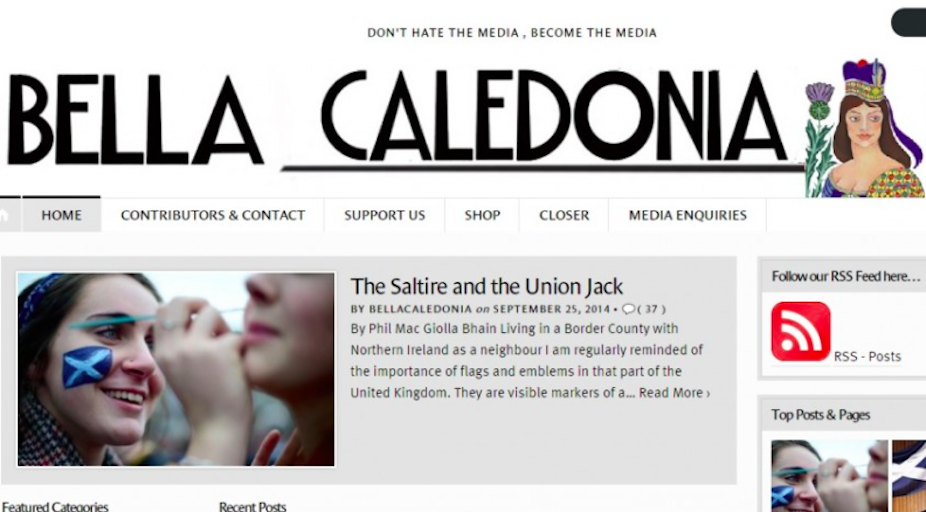As the Scottish independence movement contemplates a possible second referendum, it has been rocked by news that an online magazine that established a significant voice in the first vote could close.
Bella Caledonia is arguably the most prominent among a number of online comment sites and blogs that provide a counterbalance to a unionist-inclined press in Scotland. But now Mike Small, its editor and co-founder, has indicated the task of running the site full-time is beyond present resources. The board has said it intends to carry on, but the publication’s future is far from clear.
Bella Caledonia offers sharp online commentary and analysis from a perspective that is pro-independence but not chest-thumping. Scotland has few of these alternative platforms and it can hardly afford to lose any – especially with a second referendum threatening to raise as many questions about fair coverage as last time.
Scotland’s political and cultural development has been characterised by a disparity between its restored awareness of itself since devolution and the decline of the media. Its externally owned newspapers have been stripped of resource. Despite strong indigenous radio provision led by BBC Radio Scotland, the nation’s TV offering is locked into a pattern largely unchanged since the 1950s.
Scotland gets television largely scheduled from London from the leading BBC and STV services, with a slender offering of its own products, often at unfriendly times. There is the invaluable exception of Gaelic service BBC Alba, but it can only do so much.
The need for balance
New online media is therefore particularly important in Scotland. Started in 2007, Bella Caledonia’s readers have not necessarily been in agreement about its direction on independence or the ruling SNP. But along with the likes of Wee Ginger Dug, Wings Over Scotland, Scot Goes Pop! and Arc of Prosperity, it offers an online alternative to a press that largely remains overwhelmingly in favour of the British union – even though 45% of Scots voted in favour of independence in 2014 and opinion polls are in similar territory today.
From a field of 18 daily and 12 Sunday titles widely available in Scotland, only the Sunday Herald, The National and a few columnists elsewhere are pro-independence.

The financial challenges driving print newspapers online exist in Scotland too, of course. Bella Caledonia has relied on donations, but the battle for any kind of financial contribution is heavily contested and online news and opinion consumption increasingly fragments the consumer base – Scotland’s is perilously small in the first place. Opinion and news aggregation, which comprise much internet provision, are cheaper than news reporting, which if intended seriously is costly – hence it remains the domain of big media.
Bella Caledonia has generally tried to pay contributors – no mean feat in the current climate. It can shift more towards contributors donating content for free, but there still needs to be an adequate human resource to create this kind of product – even altruistic online producers need to live.
Crowdfunding is generally better at one-off initiatives or launches than sustained support. If, as appears, the threat to Bella Caledonia has been the burden of commitment on its editor, that only mirrors the predicament of many sparsely resourced websites which provide a voice both in Scotland and in many other countries.
The Brexit experience
Successful online alternatives to mainstream media’s news and opinion appear more important than ever in light of Brexit. London newspapers have their own economic challenges but we’ve recently learned that those of us who wrote off the political power of the press did so prematurely: it’s inconceivable that the vote last June 23 could have been swung toward an EU exit without the massed ranks of the right-wing press.
As we begin 2017, they are still engaged in persuading their readerships that Brexit has somehow already led to the sunlit uplands of British economic sovereignty even before it has happened. One of the ramifications of the debate about “post-truth politics” is how it implicates the media. Seldom has even the historically partisan London press seemed less like an apparatus of a liberal democracy. And covering the Brexit issue is no doubt making the BBC very, very nervous when it relies on the patronage of a government currently executing it.

As at so many important moments, Scotland languishes on the media fringes, with no adequate platforms for national dialogue – and it is about to be dragged out of Europe against its will. Compared to Ireland and also Catalonia, the mismatch between a strong national culture and its media provision is striking and dismal.
There is little hope that the traditional media will in future answer the democratic needs of the Scottish nation better than now. With indigenous titles like The Scotsman, The Herald and Daily Record all in grave circulation difficulties, some parts are more likely to disappear altogether – a sign that it’s not an easy time for publications of any colour to gain a foothold.
One of the unanswered mysteries of the Scottish soul is why this doesn’t appear to be of more urgent concern to the political classes. As with the tired questions of inadequate Scottish TV provision and the failing Scottish press, so also here at the still early phase of media pluralism online: the matter of the Scottish fourth estate deserves more attention on the nation’s cultural, political and economic agenda.

